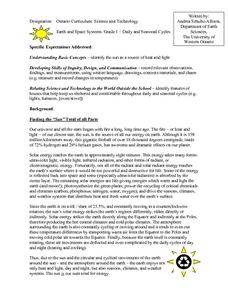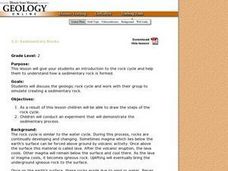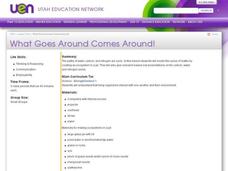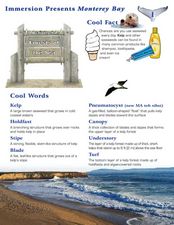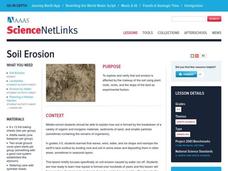Curated OER
Daily and Seasonal Cycles
First graders identify the sun as a source of heat and light. They identify features of houses that help keep use sheltered and comfortable throughout daily and seasonal cycles. Students are told that summer is the best season to...
Curated OER
The Volcano Factory
Students examine the process of tectonic plates and why the Mariana Arc is active with volcanoes. They create a model of the Mariana Arc out of clay.
Curated OER
Getting to the Core of Climate Change
Students investigate climate changes by graphing and analyzing ice core data from Greenland and Antarctica. They create, explain and report the pattern of data on a graph of ice core data. In addition they find relationships between the...
Curated OER
2.2: Sedimentary Rocks
Second graders discuss the geologic rock cycle and work with their group to simulate creating a sedimentary rock. They conduct an experiment that demonstrates the sedimentary process and draw the steps of the rock cycle.
Curated OER
What Goes Around Comes Around!
Learners create an ecosystem in a jar to show a model of the water, carbon, and nitrogen cycle. Working in small groups, they research and present orally the information they find on this cycle.
Curated OER
Pet Rocks
Young scholars complete a variety of activities related to the physical characteristics of minerals. They classify and group candy, classify rocks and complete a Pet River Rock worksheet. Students try to guess which rock goes with each...
Curated OER
Forests of the Sea
Students read about and conduct experiments to learn about the vegetation under Monterey Bay. For this Monterey Bay lesson, students read about and look at brightly colored pictures of the different types of seaweed that grows in the...
Curated OER
Examining the Fossil Record
Students create an evolutionary tree based on fossil morphology and their ages. For this fossil record lesson plan, students are given 23 pictures of fossil. They study their morphology and arrange the fossils by age and structures on a...
Curated OER
Cloudy With a Chance of Meatballs
Fourth graders participate in an activity which introduces them to common types of precipitation. They examine "Cloudy With a Chance of Meatballs" through a teacher read aloud and make a weather pamphlet.
Curated OER
RIDE THE WILD LEAF
Learners identify and interpret that leaves provide food for new trees and plants. Students cut out leaves and glue them on the appropriate
number on included worksheet. Learners collect different types of leaves and make leaf rubbings....
Curated OER
Protecting Our Planet
Students examine the impact of pollution. In this pollution lesson, students watch Protecting Our Planet, then participate in a simulation of the effect of pollution on a variety of organisms.
Curated OER
A Bit of Engineering
Students discuss the drilling process. In this engineering lesson, students get into small groups and drill their own core samples in a sandwich using a plastic tubing, a jumbo straw, a slim straw and a offee stirrer predicting...
Curated OER
Earthquake Proof Structures
Eighth graders build a structure that is able to withstand a simulated earthquake. They research earthquakes, earthquake measurement, and society's preparation for and reaction to them. Pupils build models and present them to the...
Curated OER
Life in a Cup
Third graders make and maintain a mini terrarium. They keep a daily journal of what happens in their terrarium and record daily observations and measurements.
Curated OER
Design an Island
Students explore islands. They create a two- or three-dimensional map of an island. They explain how the topography of an area influences the location of water sources, ecosystems, and human settlements. Lesson includes adaptations for...
Curated OER
Exploring for Petroleum - Modeling an Oil Reserve
Learners experiment with locating oil reserves. In this conservation activity, students use a cardboard box to create sand, rocks, and an oil reserve (water balloon). They use a probe to dig around in the box to find the oil reserve and...
Curated OER
Modeling an Oil Reserve
Students conduct an experiment. In this oil and natural gas lesson, students learn how geoscientists identify and explore reserves of petroleum. Students make a model of an oil reserve, record how much it would cost to drill...
Curated OER
Going...going...gone? Tropical Rainforests-How They Work, What They Do for Us, What's Being Done to Them...
Sixth graders explore the Tropical Rainforest and come to understand what it is and how it affects the ecosystem. In this rainforests lesson, 6th graders write about the Tropical Rainforest, imagine they are in the Tropical Rainforest,...
Curated OER
The Spectrum of a Star
Tenth graders identify stars based on their line spectra. In this astronomy lesson, 10th graders analyze spectrograph and determine the elements present in the star. They explain the relationship between temperature and star classes.
Curated OER
Mountains "Fold, Fault, Erupt, and Erode"
Fifth graders conduct an experiment to demonstrate the folding and rippling of rock to form a mountain. They identify mountain chains on a map, participate in the demonstrations, and define folding fault block, igneous eruptions, igneous...
Curated OER
Moon: NC Summer Tour Lesson 2007
Young scholars investigate craters and marea. In this crater and marea lesson, students conduct an experiment to create craters. Young scholars participate in a dance activity.
Curated OER
Soil Erosion
Students examine how erosion is affected by the composition of the soil and the slope of the land. They look at plant roots, rocks and land slope as experimental factors. They complete the associated worksheets before discussing their...
Curated OER
The Magic School Bus Out of This World
Students learn along with Ms. Frizzle's class. In this Magic School Bus lesson plan, students explore craters that objects of different sizes and weights (marbles, Ping-Pong balls, and aluminum foil balls) create.
Curated OER
Forest Canopies: View from the Top
Students examine the economic and ecological benefits of forest canopies. They read and discuss an article, answer questions, conduct research, draw field sketches of a canopy ecosystem, conduct a feasibility study, or prepare tourist...
